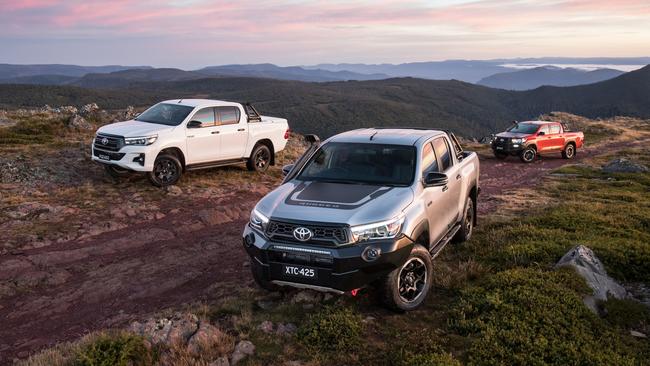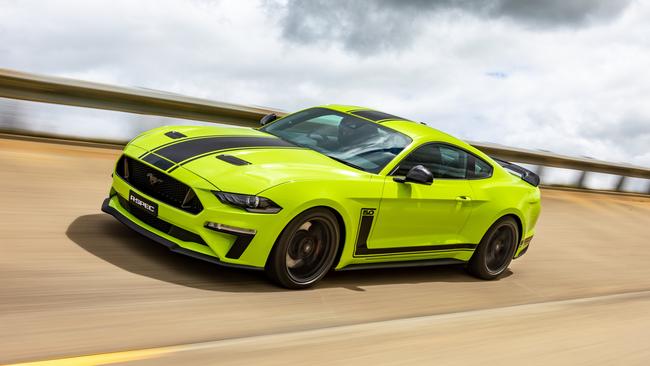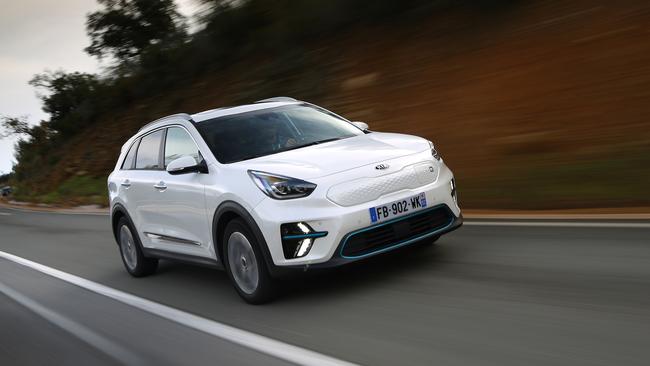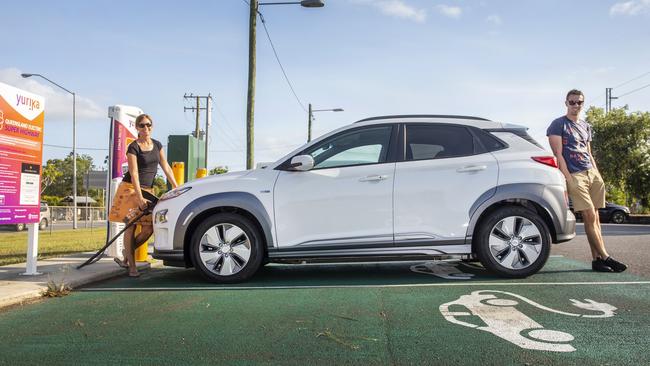Major changes coming to Australia’s cars as industry introduces emissions standards
Australians have missed out on hi-tech vehicles being sold across the globe, so the car industry has taken steps to change this forever.
Motoring news
Don't miss out on the headlines from Motoring news. Followed categories will be added to My News.
The cars we drive will change dramatically in the next decade after the car industry committed to a significant reduction in CO2 emissions.
Utes and SUVs are likely to be most affected by the new target, as manufacturers will have to introduce hybrid versions of our top selling vehicles such as the Toyota HiLux and Ford Ranger in order to meet industry emissions goals.
The Federal Chamber of Automotive Industries (FCAI) hopes its emissions target for 2030 will accelerate the introduction of electric vehicles, as car makers look to sell more EVs to offset fuel guzzlers in their fleets.
The move has been welcomed by the Morrison Government but rubbished by The Greens as “inadequate”.

Unlike Europe, the United States and Japan there are no compulsory targets in Australia for car makers to match, so the car industry has set a voluntary target in lieu of any government mandate.
FCAI chair Tony Weber said the lack of emissions standards in Australia strangled supply of electric and more efficient cars, which were diverted to countries with punitive fines and taxes in place.
“We want to bring the best technology to the market, for the benefit of Australian motorists, as quickly as possible,” he said.
“This will bring those low emission powertrains to our market earlier than if we didn’t have such a scheme.
“That’s the imperative here. That’s why we’re doing it.”
Our 2030 target will be 98 grams of CO2 produced per kilometre of driving for passenger cars and 143g/100km for utes and large four-wheel-drives. The current industry average is 163.05g/km for cars and SUVs, and 220.26g/km for four-wheel-drives and light commercial vehicles including utes.

To put that in perspective, a Toyota Corolla Hybrid currently uses 4.2L/100km and emits 97g/km.
The scheme aims to shame manufacturers into offering more efficient models through public awareness.
The objective is similar to the Australasian New Car Assessment Program (ANCAP), an independent body that crash-tests cars before publishing safety ratings.
But companies such as Ford will not be forced to stop selling popular gas-guzzlers such as the V8-powered Mustang sports car.
“We don’t anticipate any such models to be removed from the market,” Mr Weber said.
The target is soft compared to Europe, which has mandated a 95g/km average for all mainstream manufacturers by next year.

But the FCAI said it isn’t fair to compare Europe with Australia, as Australians on average prefer to drive larger and more powerful cars compared with most countries.
A spokesman for Deputy Prime Minister Michael McCormack — who is also minister for infrastructure, transport and regional development — welcomed the “industry-led approach”.
“New vehicle technologies can reduce the environmental and health impacts of road vehicle emissions, but their uptake must be driven by consumer demand, not regulation restricting consumer choice,” he said.
“Unlike the policies Labor took to the last election, this should not increase the cost of a new car or restrict the types of vehicles available in the Australian market.
“The Government has been very clear we will not be implementing a mandatory CO2 standard which would increase the cost of vehicles for Australians.”
Labor MP Mark Butler, Shadow Minister for Climate Change and Energy, said the voluntary standard reflected the government’s preference to take a back seat on the issue.
“This Government’s inaction over seven years means Australia remains an outlier in the OECD by not having mandatory vehicle emission standards,” Mr Butler said.
“This is after the Turnbull Government concluded that meaningful standards would save motorists $500 per year, as well as cutting dangerous pollution.
“Voluntary industry standards just demonstrate the fact the Morrison Government remains asleep at the wheel when it comes to saving motorists money and reducing pollution, and they cannot replace what Australia desperately needs; real leadership from a National Government.”
Michael Bradley, managing director of the Australian Automobile Association, the peak body for auto clubs such as the NRMA and RACV, questioned the effectiveness of the FCAI’s approach.
“As the announced voluntary code appears to contain no financial penalties for non-compliance, the AAA is sceptical of this code’s ability to achieve targets beyond business as usual,” he said.
“While the targets and timeframes announced are understandable and possibly sensible, they will almost certainly never be met without legislated compliance mechanisms that force car brands to either provide lower-emissions cars, or trade credits with other brands that have done so. Carrots and sticks are required for stretch targets to be met.”
Electric Vehicle Council chief executive Behyad Jafari said the car industry’s stance was “a welcome step that paves the way forward”, but that the government should do more to encourage the use of efficient vehicles.

“The government should follow the lead and introduce mandatory standards comparable to the US, the EU, and most other markets,” Mr Jafari said.
“Until this happens we’ll just have to accept that a huge proportion of the world’s most appealing EVs will be unavailable to Australian consumers.”
Senator Janet Rice, Greens Transport spokesperson, said the FCAI’s “inadequate targets are a scathing indictment of the Morrison government”.
“The fact that industry is taking action — pitiful as that action may be — before the government, shows the gaping hole in leadership from the Coalition,” she said.
“The clear pathway to reduce pollution from vehicles is to shift as rapidly as possible to zero pollution electric vehicles, phasing out polluting petrol and diesel vehicles.
“The Greens have a plan to phase out new sales of petrol and diesel cars by 2030, and support people to get the clean cars they want through a range of policy measures, including buyer incentives.”
Originally published as Major changes coming to Australia’s cars as industry introduces emissions standards
